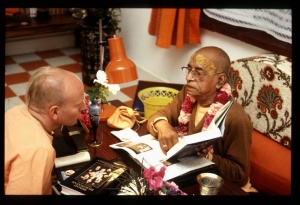SB 4.23.26

A.C. Bhaktivedanta Swami Prabhupada
TEXT 26
- saiṣā nūnaṁ vrajaty ūrdhvam
- anu vainyaṁ patiṁ satī
- paśyatāsmān atītyārcir
- durvibhāvyena karmaṇā
SYNONYMS
sā — she; eṣā — this; nūnam — certainly; vrajati — going; ūrdhvam — upward; anu — following; vainyam — the son of Vena; patim — husband; satī — chaste; paśyata — just see; asmān — us; atītya — overpassing; arciḥ — of the name Arci; durvibhāvyena — by inconceivable; karmaṇā — activities.
TRANSLATION
The wives of the demigods continued: Just see how this chaste lady, Arci, by dint of her inconceivable pious activities, is still following her husband upward, as far as we can see.
PURPORT
Both Pṛthu Mahārāja's airplane and the airplane carrying Queen Arci were passing out of the vision of the ladies of the higher planetary systems. These ladies were simply astonished to see how Pṛthu Mahārāja and his wife achieved such an exalted position. Although they were the wives of the denizens of the higher planetary system and Pṛthu Mahārāja was an inhabitant of an inferior planetary system (the earth), the King, along with his wife, passed beyond the realms of the demigods and went upward to Vaikuṇṭhaloka. The word ūrdhvam ("upward") is significant here, for the ladies speaking were from the higher planetary systems, which include the moon, sun and Venus, up to Brahmaloka, or the highest planet. Beyond Brahmaloka is the spiritual sky, and in that spiritual sky there are innumerable Vaikuṇṭhalokas. Thus the word ūrdhvam indicates that the Vaikuṇṭha planets are beyond or above these material planets, and it was to these Vaikuṇṭha planets that Pṛthu Mahārāja and his wife were going. This also indicates that when Pṛthu Mahārāja and his wife, Arci, abandoned their material bodies in the material fire, they immediately developed their spiritual bodies and entered into spiritual airplanes, which could penetrate the material elements and reach the spiritual sky. Since they were carried by two separate airplanes, it may be concluded that even after being burned in the funeral pyre they remained separate, individual persons. In other words, they never lost their identity or became void, as imagined by the impersonalists.
The ladies in the higher planetary systems were capable of seeing both downward and upward. When they looked down they could see that the body of Pṛthu Mahārāja was being burned and that his wife, Arci, was entering into the fire, and when they looked upward they could see how they were being carried in two airplanes to the Vaikuṇṭhalokas. All of this is possible simply by durvibhāvyena karmaṇā, inconceivable activity. Pṛthu Mahārāja was a pure devotee, and his wife, Queen Arci, simply followed her husband. Thus they can both be considered pure devotees, and thus they are capable of performing inconceivable activities. Such activities are not possible for ordinary men. Indeed, ordinary men cannot even take to the devotional service of the Lord, nor can ordinary women maintain such vows of chastity and follow their husbands in all respects. A woman does not need to attain high qualifications, but if she simply follows in the footsteps of her husband, who must be a devotee, then both husband and wife attain liberation and are promoted to the Vaikuṇṭhalokas. This is evinced by the inconceivable activities of Mahārāja Pṛthu and his wife.